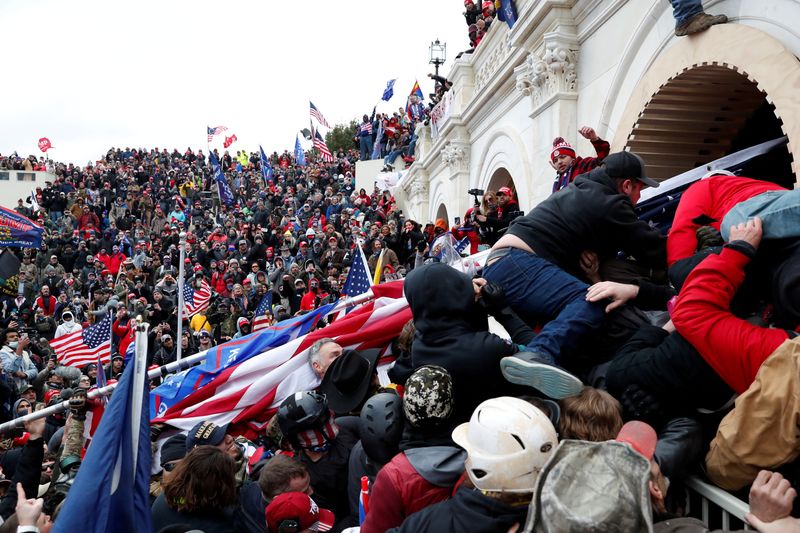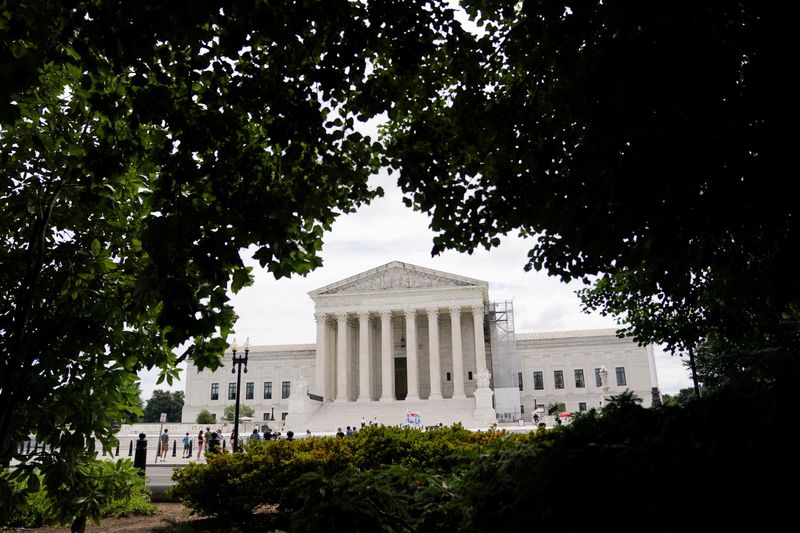By John Kruzel
WASHINGTON (Reuters) -The U.S. Supreme Court raised the legal bar on Friday for prosecutors pursuing obstruction charges in the federal election subversion case against Donald Trump and defendants involved in the Jan. 6, 2021, attack on the Capitol.
The justices ruled 6-3 to throw out a lower court's decision that had allowed a charge of corruptly obstructing an official proceeding - congressional certification of President Joe Biden's 2020 victory over Trump that the rioters tried to block - against defendant Joseph Fischer, a former police officer.
The court, in the decision authored by Chief Justice John Roberts, took a narrow view of the obstruction statute, saying that prosecutors must show that a defendant "impaired the availability or integrity" of documents or other records related to an official proceeding - or attempted to do so.
Roberts was joined by fellow conservative Justices Clarence Thomas, Samuel Alito, Neil Gorsuch and Brett Kavanaugh, as well as liberal Justice Ketanji Brown Jackson.
Roberts rejected the Justice Department's more expansive reading of what constitutes obstruction, calling it "a novel interpretation (that) would criminalize a broad swath of prosaic conduct, exposing activists and lobbyists alike to decades in prison."
Conservative Justice Amy Coney Barrett wrote a dissent, joined by liberal Justices Sonia Sotomayor and Elena Kagan.
Fischer had challenged the obstruction charge, which federal prosecutors brought against him and hundreds of others - including Trump - in Jan. 6-related cases.
The lower court was directed to reconsider the matter in light of Friday's ruling.
The ruling was a potential boost for Trump, the Republican candidate challenging Biden, a Democrat, in the Nov. 5 U.S. election.
Trump was hit with two obstruction-related charges as part of a four-count criminal indictment in a case brought last year by Special Counsel Jack Smith. The crime falls under the 2002 Sarbanes-Oxley Act, a federal law passed after the accounting fraud scandal at now-defunct energy company Enron.
Federal prosecutors have accused Trump of pressuring government officials to overturn the 2020 election results and encouraging his supporters to march to the Capitol on Jan. 6 to push Congress not to certify Biden's victory, based on false claims of widespread voting fraud. On the day Congress met to certify the results, Trump supporters stormed the Capitol, broke through barricades, attacked police officers, vandalized the building and forced lawmakers and others to flee for safety.
Trump and his allies also devised a plan to use false electors from key states to thwart certification.
George Washington University Law School professor Randall Eliason, a former federal prosecutor, said Smith might not be deterred from pursuing the obstruction charges against Trump despite the new higher bar.
"The court recognizes that submitting false evidence could still violate the statute, so it seems like with the fake electors scheme the charges should still survive," Eliason said.
The Supreme Court is expected on Monday to issue its ruling on Trump's bid for immunity from prosecution in the federal election subversion case. Trump has pleaded not guilty.
'TRUMP THINKS OTHERWISE'
Biden's campaign said Friday's ruling "does not change the fundamental truth that Donald Trump will always put himself over our democracy."
"Violent insurrectionists and those who encourage them must be held accountable, but Donald Trump thinks otherwise," a campaign statement added.
Attorney General Merrick Garland expressed disappointment in the ruling.
"January 6 was an unprecedented attack on the cornerstone of our system of government - the peaceful transfer of power from one administration to the next," Garland said, adding that Friday's decision "limits an important federal statute that the department has sought to use to ensure that those most responsible for that attack face appropriate consequences."
The charge carries a sentence of up to 20 years in prison if convicted, though Jan. 6 defendants convicted of obstruction have received far lesser sentences.
'JAN. 6 HOSTAGES'
Addressing a campaign rally in Virginia, Trump cited Friday's ruling and called for people prosecuted on charges related to the Capitol attack to be released.
"Free the Jan. 6 hostages now," Trump said, as the crowd cheered.
Fischer was accused by prosecutors of charging at police guarding a Capitol entrance. Fischer, at the time a member of the North Cornwall Township police in Pennsylvania, got inside the building and pressed up against an officer's riot shield as police officers attempted to clear rioters, according to prosecutors. He remained in the Capitol for four minutes before police pushed him out, they said.
Fischer has been awaiting trial on six other criminal counts, including assaulting or impeding officers and civil disorder, while his obstruction challenge played out.
U.S. District Judge Carl Nichols, a Trump appointee, granted Fischer's request to dismiss the obstruction charge, ruling it applies only to defendants who tampered with evidence. The U.S. Court of Appeals for the District of Columbia Circuit reversed that decision, prompting Fischer's Supreme Court appeal.
Federal prosecutors estimate that about 250 of the roughly 1,400 people charged in the Capitol attack could be impacted by the ruling. According to Justice Department data, about 50 Jan. 6 defendants were convicted and sentenced on the obstruction charge with no other felony. Of those, about half are currently serving a sentence of incarceration, less than 2% of all charged cases.
The legal issue in the case involved how two parts of the obstruction law fit together. The first provision prohibits obstructing an official proceeding by destroying "a record, document or other object." The second part makes it a crime to "otherwise obstruct" an official proceeding.
Barrett said Congress had written the obstruction statute to be "expansive."

"Joseph Fischer allegedly participated in a riot at the Capitol that forced the delay of Congress's joint session on January 6th," Barrett wrote in dissent. "Blocking an official proceeding from moving forward surely qualifies as obstructing or impeding the proceeding by means other than document destruction. Fischer's alleged conduct thus falls within (the law's) scope."
Trump in a separate case in New York state court was convicted by a jury on May 30 on 34 counts of falsifying documents to cover up hush money paid to a porn star to avoid a sex scandal before the 2016 election. Trump also has pleaded not guilty to election-related charges in state court in Georgia and federal charges involving classified documents in Florida.
